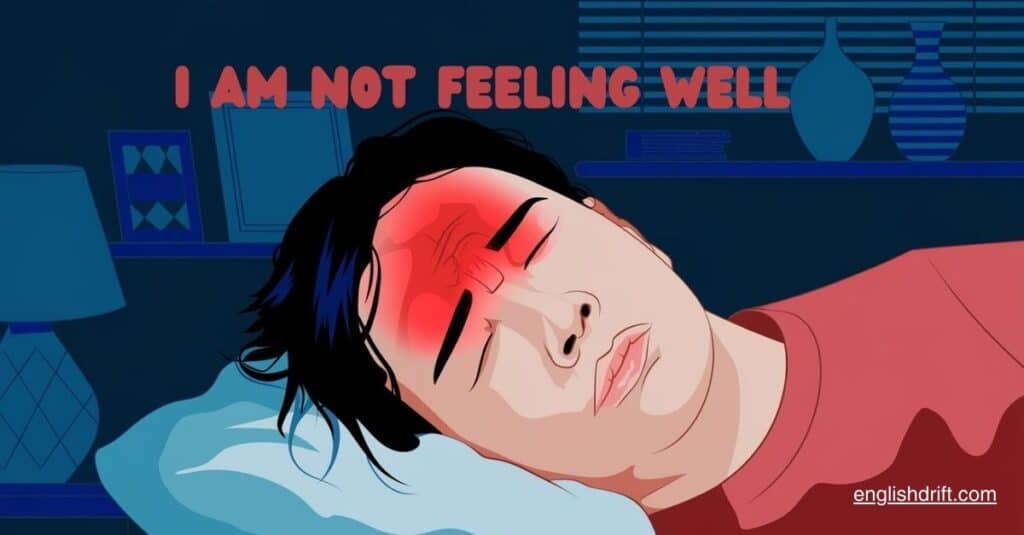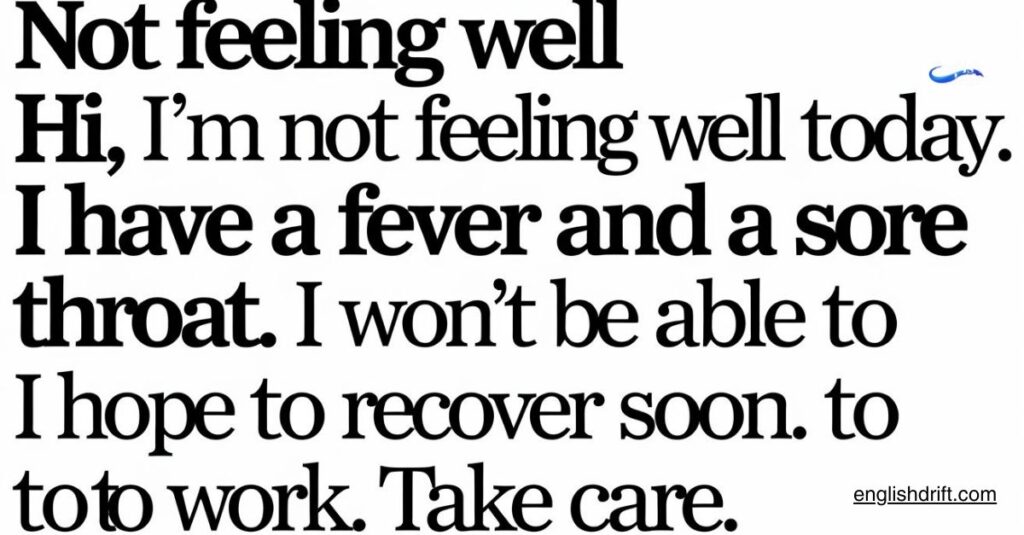Feeling under the weather can happen to anyone, but how you express it can make all the difference. Instead of always relying on the straightforward “I am not feeling well,” consider using a variety of phrases that sound more natural, polite, or even creative.
Whether you need to communicate illness at work, in a social setting, or with loved ones, having a range of alternatives at your disposal ensures your message comes across with the right tone. From subtle health related idioms to professional expressions of I am still not feeling well today, explore 19 refreshing ways to say you’re unwell and keep your conversations both thoughtful and engaging.
how to say not feeling well professionally
- I’m under the weather
- I’m feeling off today
- I’m not at my best
- I’m feeling poorly
- I’m a bit rundown
- I’m not up to par
- I’m feeling a bit ill
- I’m not feeling like myself
- I’m out of sorts
- I’m feeling under the weather
- I’m a little unwell
- I’m not in great shape
- I’m feeling a bit off
- I’m dealing with something
- I’m not feeling 100%
- I’m not at full strength
- I’m not feeling too good
- I’m not well today
- I’m a bit under the weather
Creative Alternatives to “I Am Not Feeling Well”

Here’s a list of creative ways to express that you’re not feeling your best, each with a brief explanation and two real-world examples.
1. “I’m under the weather”
- Explanation: A casual idiom that means feeling mildly unwell. It’s friendly and commonly used without sounding too serious or specific.
- Examples:
- “I’ll skip tonight’s dinner. I’m a bit under the weather.”
- “I’m feeling under the weather, so I think I’ll stay home today.”
2. “I’m feeling off today”
- Explanation: Indicates a sense of discomfort or fatigue without specifying any illness, suitable for mild, non-serious conditions.
- Examples:
- “Sorry if I’m quiet; I’m feeling a bit off today.”
- “I won’t be able to make it. I’m feeling off and need to rest.”
3. “I’m not at my best”
- Explanation: A gentle, understated way to indicate reduced performance or energy, often used professionally to excuse slight delays or lapses.
- Examples:
- “Please forgive any mistakes; I’m not at my best today.”
- “I’ll get back to you later—I’m not at my best right now.”
4. “I’m feeling a bit ill”
- Explanation: A simple and direct phrase that communicates mild sickness without being overly detailed or alarming.
- Examples:
- “I’ll have to pass on tonight’s plans; I’m feeling a bit ill.”
- “I might need to leave early; I’m feeling a bit ill today.”
5. “I’m not up to par”
- Explanation: Often used to indicate below-normal energy or health, implying a temporary dip in one’s usual standard.
- Examples:
- “I’ll try my best, but I’m not up to par today.”
- “Can we reschedule? I’m not feeling up to par right now.”
6. “I’m out of sorts”
- Explanation: An idiomatic way to say you’re feeling unbalanced, emotionally or physically, without specific symptoms.
- Examples:
- “I won’t be coming in today—I’m a bit out of sorts.”
- “I’ll catch up tomorrow; I’m feeling a little out of sorts.”
7. “I’m feeling poorly”
- Explanation: A traditional, polite expression to convey minor illness, often used in informal or friendly settings.
- Examples:
- “I won’t make it for coffee; I’m feeling poorly.”
- “Grandma called to say she’s feeling poorly today.”
8. “I’m feeling a bit rundown”
- Explanation: Commonly used to suggest fatigue from overwork or stress rather than serious illness.
- Examples:
- “I think I need a break; I’m feeling a bit rundown.”
- “I’ll skip the meeting—I’m feeling too rundown today.”
9. “I’m not myself today”
- Explanation: Indicates a slight deviation from your usual state, hinting at fatigue or mild discomfort without being too direct.
- Examples:
- “Sorry if I seem off; I’m just not myself today.”
- “I’ll pass on tonight’s plans; I’m not quite myself.”
10. “I’m feeling a bit drained”

- Explanation: Suggests a temporary lack of energy, often due to overexertion or mental fatigue, rather than illness.
- Examples:
- “After that project, I’m feeling a bit drained.”
- “I’ll need to rest; I’m feeling pretty drained today.”
11. “I’m coming down with something”
- Explanation: Implies the early stages of illness, suggesting that symptoms are just starting to appear.
- Examples:
- “I might need to cancel; I think I’m coming down with something.”
- “I’m feeling off, like I’m coming down with something.”
12. “I’m feeling slightly under the weather”
- Explanation: A variation on “under the weather,” indicating mild symptoms in a softer, non-specific way.
- Examples:
- “I’ll take it easy; I’m feeling slightly under the weather.”
- “Sorry, but I’ll have to miss it. I’m slightly under the weather.”
13. “I need to recharge”
- Explanation: Conveys the need for rest or downtime, without explicitly mentioning illness, often due to stress or overwork.
- Examples:
- “I’ll skip dinner tonight. I need to recharge.”
- “I need a day to recharge—I’m feeling low on energy.”
14. “I’m feeling unwell”
- Explanation: A straightforward way to say you’re not in good health, appropriate in formal or informal settings.
- Examples:
- “I’ll sit this one out; I’m feeling unwell.”
- “Could I head home early? I’m feeling unwell.”
15. “I’m having an off day”
- Explanation: Indicates a day where things feel slightly off or less-than-optimal, without clear symptoms of illness.
- Examples:
- “I’m sorry if I’m slow today—I’m having an off day.”
- “I’ll join tomorrow; I’m just having an off day.”
16. “I need a bit of rest”
- Explanation: Emphasizes the need to relax without directly implying illness, useful in busy or professional settings.
- Examples:
- “I’ll be back tomorrow; I just need a bit of rest.”
- “I won’t join tonight—I really need some rest.”
17. “I’m under a lot of strain”
- Explanation: Implies feeling exhausted or overwhelmed, without specifically referring to illness.
- Examples:
- “I’ll have to take a break—I’m under a lot of strain.”
- “Can we reschedule? I’m feeling under a lot of strain.”
18. “I’m not quite right”
- Explanation: Hints at a general feeling of discomfort or imbalance, without specifying illness.
- Examples:
- “I’ll skip lunch today; I’m not quite right.”
- “I’ll need some time to rest—I’m just not feeling quite right.”
19. “I’m feeling slightly off-balance”
- Explanation: Suggests a mild physical or mental imbalance, often used to describe fatigue or stress.
- Examples:
- “I won’t join the group today; I’m feeling slightly off-balance.”
- “I’ll need some rest; I’m a little off-balance today.”
These alternatives allow you to communicate that you’re not feeling your best while maintaining the appropriate tone for any setting. By choosing the right phrase, you can express your needs clearly and respectfully, regardless of the situation.
How to Send a “Not Feeling Well” Message to Your Boss

When sending a “not feeling well” message to your boss, it’s important to remain professional and concise, while ensuring you communicate clearly about your situation. Here are a few key points to follow:
- Keep It Professional: Your message should remain polite and respectful. Avoid going into too much detail about your illness unless necessary.
- Be Clear and Brief: Let your boss know you’re unwell and may need time off, but keep it short. This shows you respect their time.
- Offer a Solution or Next Step: If possible, mention whether you need to take a day off or if you will be available for work remotely. This ensures your boss knows how to manage the situation.
- Use the Right Tone: Be sure to maintain a tone that matches your workplace culture—some offices may prefer a more formal approach, while others are more casual.
Not Feeling Well Message in Email
Subject: Sick Day Notification
Dear [Boss’s Name],
I’m reaching out to let you know that I am not feeling well today and won’t be able to come into work. I will keep you updated if my condition changes and may need additional time to recover. Please let me know if anything urgent comes up during the day.
Thank you for understanding.
Best regards,
[Your Name]
This message strikes a balance between being informative and professional. It also allows room for flexibility, should the situation change. Always remember to notify your boss as soon as possible to allow them to adjust any plans accordingly.
Why It’s Helpful to Have Alternatives to “I Am Not Feeling Well”

Finding the right words to express that you are not feeling well can be surprisingly important, especially in professional or social settings. While “I am not feeling well” is straightforward, having alternatives allows you to better match the tone and setting of the conversation. Here are a few reasons why it’s helpful to have a variety of expressions:
1. Politeness and Professionalism
Using a tactful phrase to express illness can show respect for the setting, especially if it’s a formal environment like work or a business meeting. Phrasing like, “I am feeling a bit under the weather” can communicate the message subtly, without drawing too much attention or concern. It allows you to be honest while also sounding professional.
2. Setting the Right Tone
Sometimes, “I am not feling well” may sound too direct, especially when dealing with colleagues or acquaintances who don’t need personal details. Softer alternatives, like “I am not at my best today,” can imply you’re feeling unwell without going into specifics. This keeps the tone light and appropriate for more formal interactions.
3. Avoiding Unwanted Attention
Saying “I am not feeling well” can sometimes lead to more questions or concern than you intended. Phrases like “I am feeling off today” or “I am a bit rundown” can suggest a mild issue, allowing you to communicate your state without inviting too much follow-up.
4. Expressing Levels of Discomfort
Not all illnesses or discomforts are the same. Having different phrases can help you express the intensity of how you feel, from mild unease (“I am feeling a little off”) to more serious discomfort (“I am coming down with something”). This allows you to adjust your wording based on how unwell you actually feel, making your message more accurate.
5. Conveying Empathy and Consideration
If you need to excuse yourself from an event or meeting, using considerate language can soften the message. By choosing phrases like “I am not up to par today” or “I am not quite myself,” you acknowledge the situation gently. This approach shows respect for others’ time and plans, which can be particularly important in team settings.
6. Flexibility Across Settings
Whether you’re speaking to a friend, a coworker, or a supervisor, having a variety of ways to say you’re not feeling well gives you flexibility. More casual expressions, like “I am feeling under the weather,” work well with friends, while phrases like “I am experiencing some discomfort” are suitable for more formal situations.
In summary, finding alternatives to “I am not feeling well” can enhance your communication, showing awareness of the setting and respect for your audience. With a range of expressions, you can adapt to any situation smoothly, keeping the conversation both honest and appropriate.
how do you say i am not feeling well for the Situation
When selecting a phrase to communicate that “I am not feeling well,” context matters. From the formality of the setting to your personal style, the right choice of words can convey your message with the perfect tone. Here’s a guide on when each type of phrase may be most effective, along with tips on aligning your word choice with your audience and personality.
1. Context Tips: Choosing Phrases for Formal vs. Informal Settings
- Formal Settings
In workplaces or professional gatherings, subtlety and professionalism are key. Phrases like “I am feeling unwell,” “I am not at my best,” or “I may need some rest today” are polite and indirect. These expressions convey your need for understanding or support without oversharing, making them suitable for emails to supervisors or meetings with clients. - Example for Formal Use: “I apologize if I am not fully engaged today; I am feeling a bit off and may need to take it easy.”
- Semi-Formal or Social Gatherings
At friendly but slightly formal events, you can be a bit more personal yet respectful. Expressions like “I’m a bit rundown” or “I’m under the weather” add a familiar touch while still conveying respect. They work well in social gatherings where you may not need to share many details but still want people to understand. - Example for Semi-Formal Use: “I may have to skip our outing today; I am a bit rundown and could use some rest.”
- Casual or Informal Settings
With close friends or family, feel free to be straightforward or even humorous, depending on your relationship. Phrases like “I’m feeling poorly” or “I’m not myself today” can let others know how you feel while allowing room for support. These can make it easier to share your state without over-explaining. - Example for Informal Use: “I’m just not myself today—I think I’ll relax at home and recharge.”
2. Personalized Use: How Personality, Audience, and Situation Affect Word Choice
- Personality Influence
Some people naturally lean toward more reserved expressions, while others might be more open. Choosing a phrase that matches your personality can make your message feel authentic. If you prefer a straightforward approach, “I’m feeling unwell” or “I’m feeling a bit ill” might work best. Those with a lighthearted or humorous tone might use idioms like “I’m under the weather” to keep the conversation casual. - Audience Sensitivity
Always consider the audience. For example, with a sensitive audience, a phrase like “I’m not quite myself” is gentle, while “I’m a bit rundown” works well with those who are familiar with your everyday energy and know when you’re not at your best. - Situational Nuances
The situation itself can impact which phrase is most appropriate. In urgent situations, being direct (e.g., “I’m sick”) may be necessary, whereas, for non-urgent matters, you might opt for softer expressions like “I’m not feeling up to par” to avoid alarming others.
Choosing words that balance your personal tone with the expectations of your audience can help convey your message effectively, allowing you to express your need for rest or support in a way that feels right for both you and the situation.
Conclusion
Choosing the right way to say “I am not feeling well” can help you communicate more effectively. Whether you need to be formal, casual, or polite, using the right phrase can make a big difference. It shows you’re thoughtful about your words and considerate of the situation.
Next time you’re unwell, try one of the 19 alternatives we discussed. It will make expressing yourself easier, more natural, and even more respectful. Your words can go a long way in making your communication clear and kind.
FAQ’s
What is another way to say “I am not feeling well”?
Instead of saying “I am not feeling well,” you can try phrases like “I’m under the weather,” “I’m feeling off,” or “I’m a bit run down.”
How do I say that I am not feeling well?
You can say “I’m not at my best” or “I’m feeling poorly” to communicate that you’re unwell without being too direct.
How to professionally say you’re not feeling well?
In professional settings, it’s best to say “I’m feeling unwell” or “I’m experiencing some discomfort today.” This keeps the tone polite and respectful.
What can I say instead of feeling sick?
Alternatives include “I’m not feeling my best,” “I’m under the weather,” or “I’m a bit off today.”
What is the better way to say “I am not well today”?
You can say “I’m not feeling well today” or “I’m not at my best today” to keep the message polite and clear.
READ MORE
- 20 other Ways to Say “Happy Wedding Anniversary”
- 21 Thank You for Coming to the Reunion Messages
- 81+ Thank You For Your Continuous Support And Encouragement
- 19 Unique synonyms of get well soon messages (With Examples)
- how to say thank you for an unexpected gift : 100+ Massages
- 17 Other Ways to Say “I Hope Everything Is Going Well” (With Examples)

Henry James is an experienced blogger at English Drift, specializing in English grammar and vocabulary. With a passion for language and clear communication, Henry helps readers enhance their writing skills through insightful guides and practical tips.







